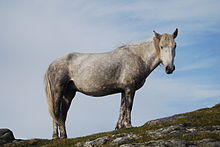Eriskay pony

An Eriskay pony on Eriskay
|
|
| Country of origin | Outer Hebrides, Scotland |
|---|---|
| Traits | |
| Distinguishing features | Dense, waterproof coat, large head. |
| Breed standards | |
The Eriskay Pony is a breed of pony from Scotland. It is generally grey in colour, and has a dense, waterproof coat that protects it in harsh weather. The breed developed in ancient times in the Hebrides islands in Scotland, and a small population remained pure and protected from crossbreeding by the remoteness of the islands. It is used for light draught work, as a mount for children, in many equestrian disciplines, and for driving. The breed is rare today, with the Rare Breeds Survival Trust considering their status critical. There are two breed registries for the Eriskay, the first formed in 1971 and the second in 1986.
The Eriskay Pony generally stands between 12 and 13.2 hands (48 and 54 inches, 122 and 137 cm). It is usually grey in colour, although a few are bay or black. Dark coloured animals generally have the pangaré characteristics of a light-coloured muzzle and ring around their eye. However, according to breed standards, they should not have an eel stripe.Chestnut, piebald, skewbald and excess white markings are discouraged by breed registries. The winter coat is dense and waterproof to protect from the harsh climate, with a thick mane and tail. The head is large, with a wide forehead. The neck and shoulders are well muscled, and the chest deep but generally not broad. The rib-cage is long and the loins short, which increases the strength of the back. The croup is slightly sloping. It is quite similar to the Exmoor pony in body type. The Eriskay has an easy-going temperament and is suitable as a mount for children. It is used for light draught work, as well as dressage, show jumping, three-day eventing, western riding and driving. Eriskays have successfully competed in combined driving at highly competitive international level competitions sanctioned by the Fédération Équestre Internationale. They have also been used in therapeutic horse-riding.
...
Wikipedia
